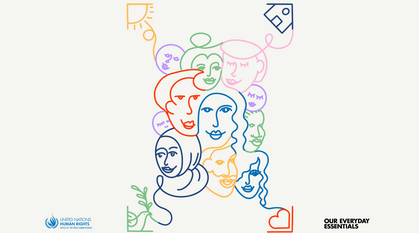A Quaker approach to mental health
Bev Smith reflects on different Quaker experiences of mental ill health.

Over the last year, the global health crisis has affected all of us. Both our physical and mental health has been shaped by our different experiences of the pandemic, through the kind of work we do, our caring responsibilities, our home and work lives. For some the pandemic's impact on mental health will have brought new and challenging experiences. For others, old feelings may have resurfaced or healthy coping mechanisms been upended by the disruption to what was once normal. So what do Quakers have to say about mental health in this current time?
Quaker involvement with mental health goes right back to 1796. William Tuke founded The Retreat in York, a mental health hospital for Quakers. People were treated with respect, given useful work, welcomed into the community there – loved. This was in sharp contrast to the harsh and often inhumane treatment that people received in asylums at that time. The approach was revolutionary and helped shape some of the practices of modern mental health care.
My colleague Alison Mitchell, who works for the Quaker Mental Health Fund, took part in conversations with Quakers and produced a report called Mental health conversations (PDF). She explored why mental health is important to Quakers:
"Mental health is important to Quakers because we strive for truth. How truthful can we be about our feelings? How much truth can we accept from others? Reflecting on our emotional well-being can support a deep consideration of this testimony."
"Mental health is important to Quakers because part of our spiritual journey can be to reflect on our identity, on how we relate to one another, on how we build our relationship with God."
An all-embracing spirituality
This notion of how we relate to ourselves, each other and the divine as part of our spiritual life is an important one. Very early on in our Quaker history George Fox, one of the founders of Quakerism, learned that part of his spiritual journey was to embrace the darker side of himself – what the psychoanalyst Carl Jung labelled our shadow. The following passage from Quaker faith & practice explains what happened to him:
"If we set our hearts on goodness as a personal goal, it means that we have to ignore or suppress all the other parts of ourselves that do not fit into our ideal of goodness. That was what George Fox had already done and he was actually shocked when, on the first part of his inward journey, he came upon the dark and unacceptable parts of himself.
Like Simone Weil, the twentieth century mystic, he found that he knew from the inside a potential for all possible crimes. His fantasies were guided by no one but himself, but he quickly made the acquaintance of the things inside him that could be bestial, murderous and depraved.
Instead of slamming the door of his consciousness, as many of us do when we come on the less acceptable bits of our inner world, he went on through them, understanding that he would not be of any use to others if he did not acknowledge in himself the impulses to kill, to lust or cheat or indulge his more primitive passions.
If he had not had the courage to accept what he discovered, he would never have made the discovery that sets Quaker spirituality apart from the narrow righteousness of the Puritans. He found that, having faced and acknowledged his dark self, he came upon a more liberating truth at the heart of himself.
He experienced the moment of enlightenment which enabled him to trust the creative and intuitive part of himself and know that it could not be obliterated by the dark side… He spoke of 'the ocean of darkness and the ocean of light'. Both are symbols of the unconscious and of the contradictions and polarities of our being – our dark negativities and our shining possibilities."
Jo Farrow, 1984
Quaker faith & practice 26.29
So Quaker spirituality is in essence all-embracing and inclusive of ourselves and others which of course includes those with mental distress. While working as a Quaker chaplain at the Retreat Hospital in York, Bronwen Gray, held a Spirituality Group with staff and patients. Together they came up with the following definition of spirituality: "what uplifts us, makes us whole, connects us".
Connection and care
Connection is what gives purpose and meaning to our lives and closely connected to this is caring for each other. One of our core Quaker beliefs is that there is that of God in everyone so every person is of value, important and worthy of care.
An important part of caring within Quakerism is listening. In this interview with Palmer Parker, a writer and Quaker, he talks about his own experience of depression. At the time people tried in various ways to cheer him up or make him feel better but these were often unsuccessful. What really helped him was a visit from a Quaker friend who came every week and just massaged his feet without talking too much but being empathetic. I was struck by how important kindness and being alongside someone is when they are in mental distress.
So this takes us back to where Quakers first started: treating those with mental distress with kindness, humanity and respect.


